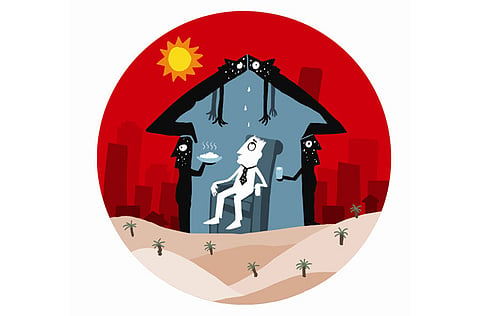Not just shadows in the background
The Middle East would not be what it is without the sacrifice of the unskilled Asian expatriates who come to work here

You see them often when driving. Silently they toil on the sides of roads, often in the heat of the day, picking up litter that motorists so generously fling from their passing vehicles.
Or they perch precariously on high-rises still under construction, taking risks we would not dare to contemplate. There are moments when you encounter an army of them busily preparing a road for resurfacing. Or you run into them in restaurants as they cheerfully guide you to your table and serve you your food without much fuss or bother.
They pump gasoline into our cars; they deliver water to our homes or cart away our sewage in tankers; they tend to livestock and orchards on our farms and fields; and they bag our groceries. They guard our homes or clean the toilets in our malls. These are the unskilled workers from the East.
A very different experience
Unlike their western or skilled Asian counterparts, who enjoy comfortable amenities and accommodation with even more comfortable salaries, these unskilled Asian expatriates are not bestowed such luxuries. Instead, at the end of their long working days, they are collectively bused — more often than not in run-down buses and other forms of transport that do not have air-conditioning or comfortable seating — to their accommodation.
And when they do retire to their housing, it is usually a collective, shared space that is sub-standard and unworthy. And yet they do it without a complaint. They have mouths to feed back home, and they are on a mission to accomplish just that. Their personal comfort is not their priority.
We tend to look at them as background fixtures, so used are we to their presence everywhere. But each of them is a human being with warm blood running through his or her veins and a resilience to the many forms of abuse they are subjected to, and which they endure stoically.
Some are married with young and hungry children. Others have the responsibility of providing for their ageing parents or younger siblings. All have come to this part of the world to try to put food on the table for their loved ones back home and provide their families with comfort and hope — things that they have denied themselves.
They are the Bangladeshis, Nepalese and Filipinos who are an integral part of the machinery that helps run this region. They are Indians, Afghans, Sri Lankans, Pakistanis, Burmese, Vietnamese and Indonesians who have accepted this challenge to perform in unfamiliar surroundings — and most deliver on their promise. Yet we usually mistake them for background fixtures.
How often do we as hosts take the time to think about their living and working environment? How many of us lend a sympathetic ear to their problems? How many of us carry out the charitable task of helping them out in their time of need?
Most are victims of unscrupulous manpower agents or employers, and find themselves at the end of a worthless contract signed in their home countries with promises of much higher salaries than they actually get when they come to this part of the world. The packages offered to them to lure them away from the comfort of their loved ones are invariably altered to their disadvantage once they arrive in their destinations, leaving them with few alternatives.
They have already hocked most of their possessions just to pay the avaricious agents for the privilege of booking a ticket to the lands of riches. And there certainly is not much gold waiting for them once they arrive. Instead there is hard work and lots of it and under very difficult and oppressive conditions — something nationals would dare not undertake.
Worthy of recognition
But it is to them that we must grant recognition, for theirs is a sacrifice like no other, and under conditions unacceptable to most of us. For without them, most of the Arabian Peninsula would have remained a desert. And without them, we would soon grind the machinery that moves us forward to a halt.
Hail to the unsung and unskilled Asian expatriates. They are not fixtures or shadows in the background. They are worthwhile human beings with wants and needs just like the rest of us.
Tariq A. Al Maeena is a Saudi socio-political commentator. He lives in Jeddah, Saudi Arabia.


